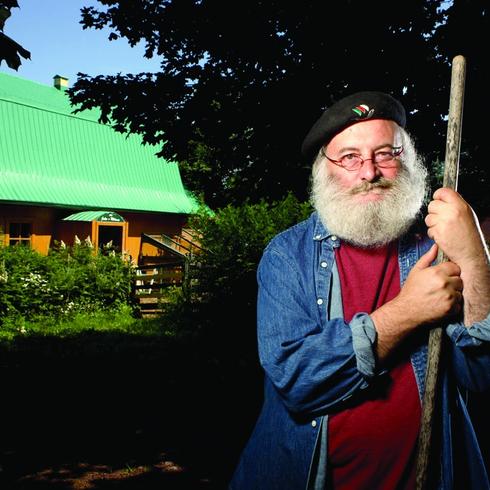
" Antiterre "
- Nominated for : The Literary Prize 2012
Writer, playwright, polemicist and a Quebec publisher, Victor-Lévy Beaulieu was born in 1945. After being a columnist for the weekly paper Perspectives in the 1960s and 1970s, he became a journalist for several daily newspapers. From 1972 to 1978 he taught literature at the National School of Theatre in Canada and wrote numerous texts diffused on the radio as well soap operas that were of great success in Quebec. Very active in the publishing field, he founded the Editions de l'Aurore in 1973, the Editions VLB in 1976 and in1995, the Editions Trois-Pistoles, which he still directs.
He has received numerous awards, including the general Governor of Canada prize in 1974 and the Duvernay and Arthur-Buies awards for all of his work. In 2001, the Athanase-David prize crowns his literary career.
In 1968, Victor-Lévy Beaulieu published his first novel Mémoires d'outre-tonneau which was followed by a long series of novels such as La nuite de Malcomm Hudd (1969), Jos Connaissant (1970), Les Grands Pères (1971) Un rêve québécois (1972), Oh Miami Miami Miami (1973), Don Quichotte de la démanche (1974), N’évoque plus que le désenchantement de ta ténèbre, mon si pauvre Abel (1976). He continues his major novelistic work in the 1980s and 1990s notably with Una (1980), Satan Belhumeur (1981), Moi, Pierre Leroy, prophète, martyr et un peu fêlé du chaudron (1982), Steven le Hérault (1985) and L’héritage in two tomes (1987 and 1991).The colossal work of Victor-Lévy Beaulieu increases every year with new titles in written forms as diverse as novels, dramatic texts, polemical essays, chronicles and even poetry.
The author is, in fact, particularly known for the large number of essays that he has written about literary characters such as Pour saluer Victor Hugo (1971), Jack Kérouac (1972), Monsieur Melville (1978), Docteur Ferron (1991), Seigneur Léon Tolstoï (1992), Monsieur de Voltaire (1994), James Joyce, l’Irlande, le Québec, les mots (2006), Se déprendre de soi-même : Dans les environs de Michel Foucault (2008).
In 2008 he published his 70th title, La Grande Tribu. C’est la faute à Papineau, his "master work" of which he announced the publication 35 years earlier.
In this novel, qualified as a grotesquerie, "Habaquq Cauchon, digging into his past, discovers that his ancestors, before their arrival in Kebek, were half men and half pigs, and their grotesqueness made them outlaws, rebels and disobedient. After four hundred years in the New World, what is left of the body and head of the original pig ? And that pig body and face, can they not only resist all political, cultural and social repressions inflicted upon them, but strengthen themselves to the point of bringing on a revolution and taking it to fraternity, equality and liberty ?
By interviewing some of the great liberators of the nineteenth century having had the hugh original épormyable poet Claude Gauvreau as companion, Habaquq Cauchon forged himself such an identity that it became forever sovereign with all the independence that it finally brings." (Presentation by the editor).
In 2009, Victor-Lévy Beaulieu publishes Bibi, a novel of a rather special kind he calls autoroman.
"In his childhood, the narrator contracted poliomylitis. He lived in Gabon for nearly three years in search of clues that Judith, his first love, had left him, so that he could join her in a world-wide treasure hunt that leads him from Quebec to Central Africa passing by Easter Island. After a lifelong silence, and after having abandoned him as a young man, Judith renewed contact with him.
Why she does not come to the rendez-vous that she fixes him from country to country, he does not know. He persists on going to the end of a journey that would be demanding, even for someone who is not disabled. This is the last step. At least he thinks so, and Judith will show up. He waits in a hotel in Libreville, emptying whiskey, glass after glass.
And it is in Libreville that he meets ... Calixthe Béyala, a Cameroonian working with necessitous children (nothing to do with a renowned novelist) and who animates a small library. Just when intimacy is established between these two solitary beings Judith resurfaces: she gives a rendez-vous to her former lover in Ethiopia, the in the Omo Valley, the cradle of Humanity. The narrator must go right to the end of his journey, to the beginning of History that might be the conclusion of his own, to finally understand the women in the form of a riddle who marked his life. Typographical games, history in History, cacophonies, enjoyment of the text and history, a world –book, a summary and apotheosis of a work in the tradition of Sterne and Joyce." (Presentation by the editor)
In 2011, with Antiterre, "Victor-Lévy Beaulieu terminates the travaux d’Hercule as he announced in 1973: Antiterre is the conclusion of “La vraie saga des Beauchemin” started with Monsieur Melville, followed with James Joyce, l’Ireland, le Quebec, les mots, La Grande tribu et Bibi. At the end of this long journey through the desert of Quebec, bringing Abel Beauchemin from Trois-Pistoles right to the banks of the Gabon and the borders of Ethiopia, is there still a possible dream, a future maker of great realities ?" (Presentation by the editor).

